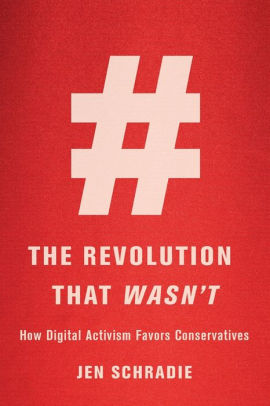Séminaire #ecnEHESS Etudier les cultures du numérique,
jeudi 21 mars 2019, de 17h30 à 19h30,
Institut des Systèmes Complexes, salle séminaire 1.1, 113 rue Nationale, 75013, Paris.
Troisième séance d’approfondissement ouverte aux auditeurs libres avec Jen Schradie, co-fondatrice de ENDL (European Network on Digital Labour) et auteure de l'ouvrage The Revolution that Wasn’t à paraître en mai 2019 chez Harvard University Press, qu’elle présentera en avant-première.
Pour s’inscrire, merci de renseigner le formulaire.
 The Revolution That Wasn’t: How Digital Activism Favors Conservatives
The Revolution That Wasn’t: How Digital Activism Favors Conservatives
From the Arab Spring and Occupy Wall Street to Black Lives Matter and #MeToo, many have hailed the democratizing power of digital activism. As a mode of political participation, it seems cheap, fast, and open to all. Yet, little is known about the variation of the actual cost of online participation in social movements across social classes. Jen Schradie’s research incorporates different social settings and spans from online to off-line activism practices, thus highlighting the high costs of online participation for working-class groups.
Despite the promise of equalizing online participation, digital activism tends to be less effective when horizontally organized volunteer groups aim to translate online goodwill into meaningful action. Conversely, large hierarchical political organizations with professional staff manage to amplify their digital impact. Not only does technology fail to level the playing field: it tilts it further, so that only the most sophisticated and well-funded players can compete.
 Since the internet's founding in 1989, a lot has happened. From the Berlin Wall falling to Trump's wall building. In my new book, #TheRevolutionThatWasnt, I contextualize the digital pendulum swing from utopia to dystopia that mark the 30th anniversary of the Web.
Since the internet's founding in 1989, a lot has happened. From the Berlin Wall falling to Trump's wall building. In my new book, #TheRevolutionThatWasnt, I contextualize the digital pendulum swing from utopia to dystopia that mark the 30th anniversary of the Web.
The dawn of the internet age….unleashed a kind of revolutionary giddiness. Those most bullish about the potential impact of this massive global network believed it would fundamentally re-order nearly every corner of civilization, inevitably for the better.
The overarching ideology of this digital utopianism was a strange brew of hyper-capitalism mixed with 60s-era-socialist idealism.The ultimate free market of ideas & commerce would create a new balance of power that favored citizens over giant organizations, companies & govts.
In the wake of the Soviet Union collapsing and the tearing down of its bureaucratic symbols, from the Berlin Wall to statues of Stalin, the internet was the phoenix rising from the ashes. It could unite where the Cold War had divided.Technology would disrupt, flatten and revolutionize hierarchies. In the place of Orwellian propaganda and old-school communication tools would be new technologies in the hands of the people. Personalization, participation, & pluralism would bring digital democracy...











